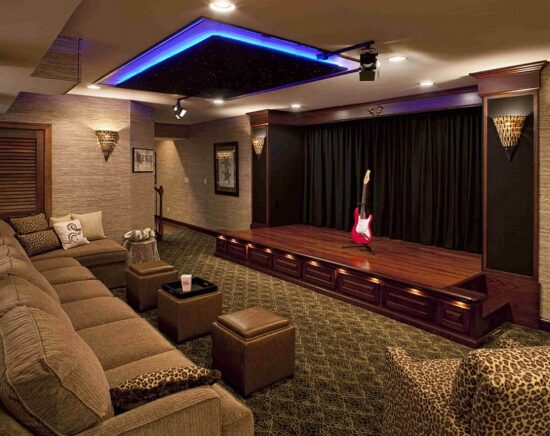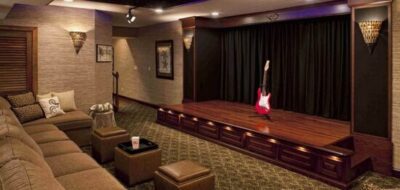If you are a budding musician, then why not build a stage for yourself at home? Not only does a home stage give you the ability to practice live performances, but it also opens up doors for paid home performances. Building a stage to perform on isn’t especially difficult. You do need to invest in some equipment and will need some rudimentary knowledge of construction, but other than that, it’s quite straightforward.
Before you begin building a stage, you need to conduct research. This article will simplify that for you by compiling all of the information that you need to know right here:

Finding Space
The first thing that you need to do when you are planning on building a musical stage is to find the space. More often than not, people build stages in their backyards. If you have a large area inside your home, then you could also build a stage there. You would need a very large home for this to work, however. An outdoor stage is a good option, because not only will it give you a comfortable place to perform, but it will also add a lot of character to your yard. In addition to finding space, you also need to make sure that you carefully and meticulously develop a plan. You can’t build a stage until you have mapped it out carefully.
Building Materials
After developing a plan, you can go ahead and purchase building materials. It’s entirely possible to buy stage kits, which are easy to assemble. Alternatively, you can buy wood and metal, and then build your own from scratch. If you aren’t an experienced builder and have never constructed any raised platforms before, then it might be best to just buy a stage kit. Stage kits have easy-to-follow instructions and are a lot safer to use. If you haven’t built a stage before, you might not install the necessary safeguarding features designed to prevent one’s stage from collapsing, splitting, or breaking. If you live in an area that rains a lot, a metal or plastic stage is better than a wooden one– a wooden stage could rot if it is exposed to a lot of water.
Sufficient Lighting
One of the most important things that you need to invest in is sufficient lighting. If you don’t buy quality lighting for your performance stage, then people won’t be able to see you in the dark (nor will you be able to see what you are doing). With all of that said, if you aren’t going to be using your stage often then it’s entirely unnecessary to buy lights. Instead, you can hire them when you need them. Stage lights can be very expensive to purchase outright. You can hire them for next to nothing, however. If you are going to be giving any performances, then hire them for a few days, then give them back when you are done with them.

Musical Equipment
Once you have figured out your stage lights and bought all of the building equipment, you can go ahead and purchase musical equipment. You won’t be able to perform unless you have it. At a very basic level, you will need speakers and a microphone. If you play an instrument, then you will also need to invest in one of those (unless you already have one). Remember that you may need wires to run from your instrument to your speakers and amps. Musical equipment can be purchased second-hand if you are on a budget. Make sure to bring it indoors when you are done with it so that it does not become damaged or get stolen.
Enlisting Help
If you are going to be building a stage and you don’t have any experience in doing it, then you should enlist help from loved ones or friends. If you know anybody that has any experience in construction, then you should ask them. Alternatively, you can hire a professional contractor to come in and help you. Professional contractors will be able to complete the job for you in an efficient and straightforward manner, ensuring that your stage is completely safe and up to scratch.
Safety Checks
If you go ahead and build your stage yourself, make sure that you perform safety checks afterwards. This is so that you can be sure it is fit for purpose. If your stage isn’t checked out thoroughly, then you or anybody else using it could become injured, if an accident were to happen.
Building a stage is relatively easy, as long as you carefully research how to (or use a pre-prepared kit). Make sure that you find a space that’s sized perfectly, otherwise, your stage will be cramped. If you will be performing for people, then you will need a space with lots of room in front, for your audience to sit.





